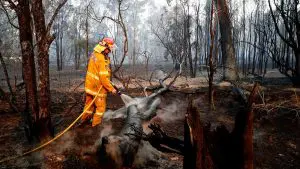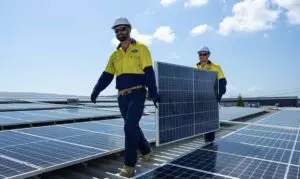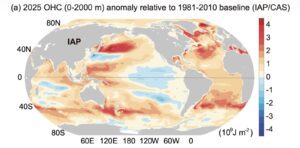The Clean Energy Council has launched a last-ditched media campaign to try to protect the 41,000GWh renewable energy target, as the Abbott government prepares to deliver what will inevitably be a fatal blow to the industry.
The CEC campaign was focused on media in Tasmania, the Sunshine Coast and in Canberra. If that choice seems a little eclectic, it is designed specifically to attract the attention of the Palmer United Party members living or staying in those regions.
The support of the PUP Senators is critical if the Senate is to resist any changes to the RET – either a large scaling back to a “real” 20 per cent, or a closure to new entrants.
In effect, it probably doesn’t matter. The fact that policy certainty will not be delivered means investment will be more or less stalled for at least another two years – although some major energy retailers may have to do some political crystal ball gazing into the 2016 election result, to see if they need maybe to commission a few renewable energy projects to meet what will remain their legal obligations.
As it is, the big retailers appear to have achieved what they set out to do – which is to slow the growth of renewables to protect their current investment in fossil fuels.
AGL Energy, which until late last year chaired the CEC, is now so highly geared to its newly acquired coal-fired generators that every $1/MWh movement in the wholesale price of electricity pushed profits up or down $38 million. More renewables will push the wholesale prices down.
The CEC campaign comes at the start of a big week for renewables in politics, and multiple warnings about the catastrophic impacts that government policy is having.
Tony Abbott met with industry minister IanTony Macfarlane and Greg Hunt on Sunday to discuss the future of the RET. None of them want the current 41,000GWh target to be retained. At best, it will be downgraded to a “real” 20 per cent – or around 25,000-27,000GWh – or closed to new entrants.
There is growing speculation, however, that the fate of the RET will be intertwined with an emerging “grand pact” on the future of climate policy, and more particularly, the Direct Action plan to reduce emissions by 5% (below 1990 levels) by 2020.
This includes suggestions of changes to the Direct Action plan to include international permits, and to lengthen the contract terms for Direct Action projects that would likely attract more finance. This is being prosecuted by independent Senator Nick Xenophon.
Of more interest is the inclusion of a “baseline” scheme that would impose penalties on power stations, for instance, if their emissions rose above a certain level (and reward them if it fell), and another idea to include gas-fired generation into the RET that could then be absorbed into the Direct Action plan. This could potentially include the direction of funds from ARENA and the CEFC towards such technologies.
The gas idea – promoted most enthusiastically by the Grattan Institute– may appeal to the government because it could lower the cost of gas generation, and cause less wind farms to be built.
It would, however, focus the development of renewables once again on the household and commercial sector, and on distributed generation as a whole.
These are politically sensitive for the government, but they are also the most easily changed, as modifications can be made without approval of parliament.
The extent of damage to the industry was highlighted on Monday when Infigen Energy, the largest listed renewables company in Australia, warned of massive write-downs across the industry, and potential breaches of its own covenants.
Suntech announced that it would cease solar R&D in Australia, following on from the announcement last week that Solar Systems had abandoned plans for a 100MW solar dish project in Mildura – the largest of its type in the world.
Both companies have cited policy uncertainty as reasons, as have project developers such as Recurrent Energy, which has already packed its bags, and numerous others that threaten to follow.
In Victoria, Keppel Prince warned of nearly 200 job losses at its manufacturing business (it makes wind towers), and the solar industry has warned of the loss of thousands of jobs.
One of the bright spots has been the resurrection of a state-based renewable energy target in Victoria – as it did in similar circumstances nearly a decade ago. This follows recent polling that shows that the current Napthine government looks set to lose power, and vows by the Greens to implement such a policy, and endorsement from former Liberal leader John Hewson.







